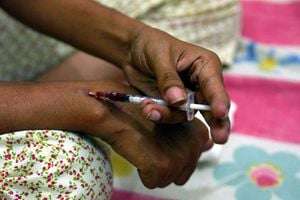Alcohol withdrawal syndrome: How to get through it

A glass of whisky. Studies show many people are introduced to drugs and alcohol at a young age.
What you need to know:
- Helpful strategies to manage the shaking include drinking a lot of water while taking alcohol, and thereafter; taking fluids that are rich in electrolytes, including oral rehydration salts.
Dear doctor,
I am 42 years old. I started drinking in my late teens. Of late I have noticed that my hands get shaky the morning after drinking. The shaking only goes away if I have a little alcohol to steady myself. For now, no one else knows that this is happening, but I am worried it will get worse. The first time it happened I avoided alcohol completely for several days and I felt worse. What can I do?
Martin
Dear Martin,
You seem to be experiencing alcohol withdrawal syndrome (AWS). The cause and severity of AWS can be different for someone who doesn’t usually drink much but had one occasion of heavy drinking, versus someone who has been drinking a lot for a long time, and different situations in between these two.
AWS can be in the form of:
- Mild withdrawal: tremors (shaking), nausea, vomiting, problems with sleep
- Major withdrawal: whole body shaking, sweating, vomiting, high blood pressure, hallucinations (seeing and/or hearing things that are not there)
- Withdrawal seizures: whole body convulsions
- Delirium Tremens: confusion, disorientation, agitation, hallucinations, fever, high blood pressure, sweating, fast heart rate. Delirium Tremens is a medical emergency that sometimes may lead to death, and requires intensive care.
The shaking may develop as a result of the impact of alcohol on the brain, or due to damage to other body systems that then have an impact on the brain. Some of the factors that can lead to shaking are:
- Nervous system rebound: Alcohol suppresses the activity of the central nervous system (the brain and spine), and when it is withdrawn, the brain’s activity suddenly increases, becoming hyperactive, which can lead to the tremors.
- Brain changes: heavy and/or prolonged alcohol consumption changes how the brain works and can also damage the brain structures.
- Dehydration: alcohol is a diuretic, which means it makes your body make more urine, so you end up losing a lot of water and electrolytes. The reduced amount of fluid and the electrolyte imbalance interferes with proper functioning of the brain, the nerves, the muscles and other body systems.
- Low blood sugar: consumption of alcohol can cause blood sugar levels to rise dramatically initially, then to drop down to dangerous levels, which can cause shaking.
- Nutrient deficiencies: prolonged heavy drinking interferes with the body’s ability to absorb different nutrients, leading to deficiencies. This is worsened by reduced feeding and/or poor diet.
- Anxiety: taking alcohol can trigger or worsen anxiety, and one of the symptoms of anxiety is shakiness.
- Build-up of toxins (acetaldehyde): when alcohol is broken down by the liver, a toxic substance called acetaldehyde is formed, and if it builds up in the body, it can cause shaking, in addition to other symptoms.
It is advisable for you to be reviewed by a doctor to identify the exact cause of the shakiness. Nutrient deficiencies can be addressed by using supplements. There are medications that may be prescribed to manage the tremors and other symptoms, and/or to deal with the alcohol use disorder. Therapy and support groups are also vital in treating alcohol use disorders.
Helpful strategies to manage the shaking include drinking a lot of water while taking alcohol, and thereafter; taking fluids that are rich in electrolytes, including oral rehydration salts or taking a solution of salt and sugar; avoiding caffeine, because it is also diuretic and causes passing of a lot of urine; regular exercise; having regular, healthy and well balanced meals that are rich in vegetables, fruits, healthy proteins and fats, and complex starches. Relaxation techniques can help to manage stress and anxiety. It is not advisable to manage alcohol withdrawal syndrome by taking more alcohol. This is only a temporary solution that maintains or worsens the underlying problem.
Dear doctor,
I get lower abdominal pain that is usually worse when my urinary bladder is full, then gets better after I pee. I also go to pee frequently, and peeing is like an emergency: I have to go immediately after I feel the urge to pass urine. I have had my urine checked many times for an infection, but none has been found. What kind of infection is this?
Milka
Dear Milka,
It is likely that you are suffering from bladder pain syndrome, also known as interstitial cystitis. Normally, the bladder expands as it fills up with urine and at some point, the stretching communicates to the nerves and up to the brain that it is time to pass urine. With interstitial cystitis, the bladder walls are inflamed and there is miscommunication, leading to getting the urge to urinate with small amounts of urine in the urinary bladder. In addition to passing urine frequently, someone may feel pressure in the bladder; feeling a sense of urgency every time you need to pass urine; pelvic/lower abdominal pain; pain when the bladder is full and eases after passing urine; urinary incontinence; having difficulty passing urine; having blood in urine; or experiencing pain during sexual intercourse. The symptoms may be worse during the periods, or they may be worsened by taking certain foods or drinks.
There is no known cause of interstitial cystitis. It is thought to be possibly caused by problems in the immune system, or with the pelvic muscles, or as a result of damage to the bladder wall. The symptoms tend to decrease and increase over time. It may also be associated with other conditions like fibromyalgia, chronic fatigue syndrome and irritable bowel syndrome.
There is no specific test to diagnose interstitial cystitis, and the diagnosis is made through a history of the illness and several tests. It is also advisable to check for other diseases such as bladder cancer, and checking for disease causing organisms that are not diagnosed through the routine tests such as chlamydia infection or TB infection.
There are medications that can be given to manage the pain, including nerve pain; medicine that controls the urge to pass urine; medicines to reduce or prevent irritation of the bladder walls; and medications that may be delivered directly to the bladder through a catheter. There are also different procedures that can be done to manage pain, relieve symptoms and treat ulcers that may be present in the bladder wall. Supportive treatments may include physical therapy, transcutaneous electrical stimulation, acupuncture and talk therapy.
Lifestyle measures that may be useful include regular exercise, cessation of smoking, practising stress management and relaxation techniques, and keeping a food and drink diary so as to identify any foods or drinks that may be worsening or triggering the symptoms.
Send your questions to [email protected]




